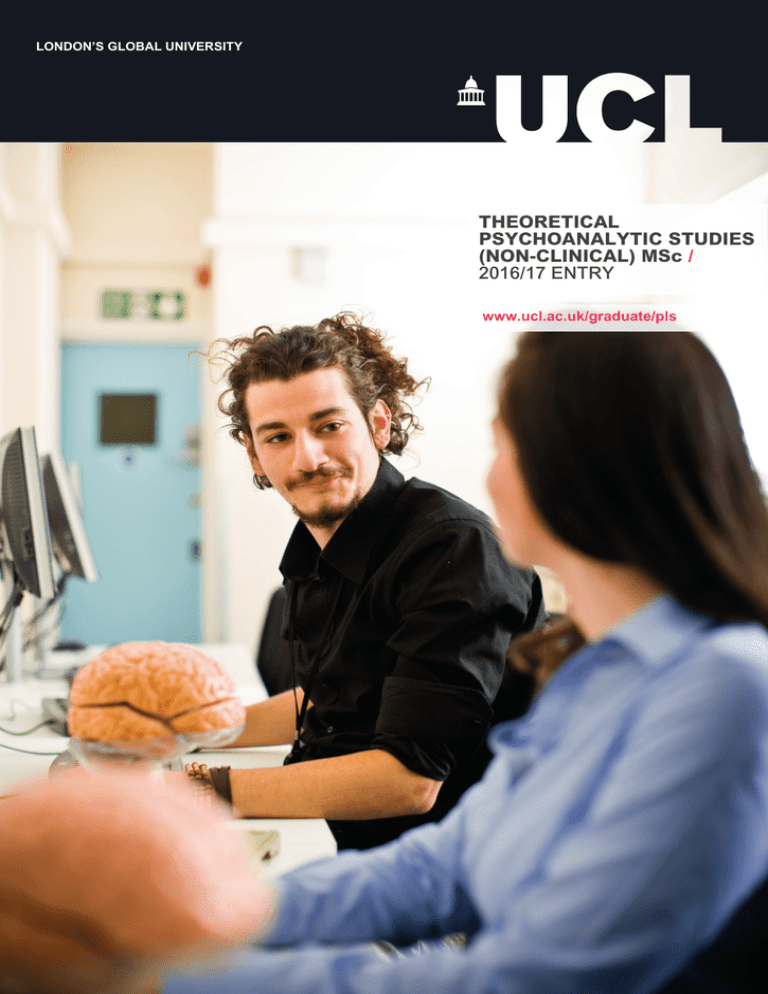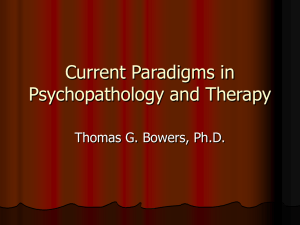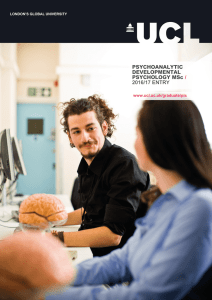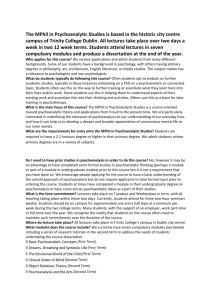THEORETICAL PSYCHOANALYTIC STUDIES (NON-CLINICAL) MSc /
advertisement

LONDON’S GLOBAL UNIVERSITY THEORETICAL PSYCHOANALYTIC STUDIES (NON-CLINICAL) MSc / 2016/17 ENTRY www.ucl.ac.uk/graduate/pls Theoretical Psychoanalytic Studies (Non-Clinical) MSc / This MSc gives students a grounding in the nature, history, content and context of psychoanalytic theory, as used by practising psychoanalysts. It provides a comprehensive introduction to current psychoanalytic thinking, rooted in the history and development of ideas and with attention to the application of psychoanalytic ideas to other fields. Degree summary Students learn about the medical and cultural context in which psychoanalysis began, through to contemporary clinical and theoretical perspectives. The teaching programme has a firm basis in the works of Sigmund Freud, but represents the breadth of the British psychoanalytic traditions, as well as major international contributions, the interface with the arts, and how psychoanalysis fits in with modern science. // // The Psychoanalysis Unit is a thriving academic centre for psychoanalytic research, with its own MPhil/PhD programme alongside the MSc. It has affiliations with the International Psychoanalytic Association, the Institute of Psychoanalysis, the Anna Freud Centre, the Menninger Clinic, and leading scholars at Yale and Harvard Universities. The unit is based within UCL's Division of Psychology & Language Sciences which undertakes world-leading research and teaching in mind, behaviour and language. Our work attracts staff and students from around the world, creating an outstanding and vibrant environment. Opportunities for graduate students to work with world-renowned researchers can exist in all areas of investigation, from basic processes to applied research. The division offers a supportive environment including numerous specialist seminars, workshops, and guest lectures. The programme is delivered through a combination of lectures, seminars and tutorials. The various seminar series are organised by experienced psychoanalysts or academics who are experts in the field concerned. Student performance is assessed through unseen written examination, coursework in the form of essays, and the dissertation. Degree structure Mode: Full-time: 1 year; Flexible: up to 5 years Students undertake modules to the value of 180 credits. The programme consists of four core modules (120 credits) and a conceptual research dissertation (60 credits). CORE MODULES // Fundamentals of Psychoanalytic Theory // Major Schools of Psychoanalysis // Core Psychoanalytic Theory // Applications of Psychoanalysis PLEASE NOTE: // Students accepted on to the Foundation Course at the Institute of Psychoanalysis in London can request to be assessed by UCL on the Foundation Course theoretical (lecture) material to count for one module of the Theoretical Psychoanalytical Studies MSc. // Those given approval can choose the 99PSGFC1 Foundation Course MSc module, in place of module PSYCGT13; Applications of Psychoanalysis. DISSERTATION/REPORT // All students undertake an independent research project which culminates in a dissertation of 10,000–12,000 words. Your career This MSc provides a very good background to formal clinical training in psychoanalysis, adult or child psychotherapy or counselling and nearly half of our graduates pursue these options. A similar number continue with their academic studies either at UCL or elsewhere, often registering for a PhD in either psychoanalytic theory or empirical research. Some graduates progress to the Doctorate in Clinical Psychology, often at UCL which has the largest number of students. Recent career destinations* include: // // // // // Turning Point, Support Worker, 2011 Kingston University, Lecturer, 2012 Arbours Association, Resident Therapist, 2011 Macmillan Publishers Ltd, Editor, 2012 Freelance, Psychotherapist, 2012 Employability This programme acts as a springboard especially for further clinical or theoretical training in the field (although it does not offer a clinical qualification). The teaching is organised and provided by eminent academics and psychoanalysts with international reputations. The option to take the Institute of Psychoanalysis Foundation Course, part of which counts towards the degree, helps with that career path. Many other able students go on to research posts in the unit or with our large network of clinical research collaborators in London and around the world. * data taken from the ‘Destinations of Leavers from Higher Education’ survey undertaken by HESA looking at the destinations of UK and EU students in the 2010–2012 graduating cohorts six months after graduation and, where necessary, departmental records. Entry requirements Normally a minimum of a second-class Bachelor's degree in any subject from a UK university or an overseas qualification of an equivalent standard. English language proficiency level If your education has not been conducted in the English language, you will be expected to demonstrate evidence of an adequate level of English proficiency. The level of English language proficiency for this programme is: Good. FEES AND FUNDING // UK & EU (2016/17) entry: £9,550 (FT) // Overseas (2016/17) entry: £23,440 (FT) Fees note: Fees for flexible, modular study are charged pro-rata to the appropriate full-time Master's fee taken in an academic session. The tuition fee schedule for 2016/17 entry can be viewed on the UCL Current Students website. Full details of funding opportunities can be found on the UCL Scholarships website: www.ucl.ac.uk/scholarships Information about the evidence required, acceptable qualifications and test providers is provided at: www.ucl.ac.uk/graduate/english-requirements APPLICATION DATE Your application CONTACT All applicants: 29 July 2016 Ms Vilma Rupeikaite Students are advised to apply as early as possible due to competition for places. Those applying for scholarship funding (particularly overseas applicants) should take note of their local application deadlines. When we assess your application we would like to learn: // why you want to study Theoretical Psychoanalytic Studies at graduate level // // why you want to study Theoretical Psychoanalytic Studies at UCL // where you would like to go professionally with your degree how your academic and professional background meets the demands of this rigorous programme Together with essential academic requirements, the personal statement is your opportunity to illustrate whether your reasons for applying to this programme match what the programme will deliver. Details on how to apply are available on the website at: www.ucl.ac.uk/graduate/apply PDF Updated: May 25, 2016 Information correct at time of going to press. See website (www.ucl.ac.uk/pals) for latest information Email: v.rupeikaite@ucl.ac.uk Telephone: +44 (0)20 7679 1899




